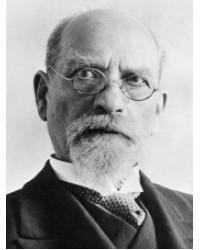Edmund Husserl

Edmund Gustav Albrecht Husserl (1859–1938) was a German philosopher who established the school of phenomenology. In his early work, he elaborated critiques of historicism and of psychologism in logicbased on analyses of intentionality. In his mature work, he sought to develop a systematic foundational science based on the so-called phenomenological reduction. Arguing that transcendental consciousness sets the limits of all possible knowledge, Husserl re-defined phenomenology as a transcendental-idealist philosophy. Husserl's thought profoundly influenced the landscape of twentieth-century philosophy, and he remains a notable figure in contemporary philosophy and beyond.
Husserl studied mathematics under the tutelage of Karl Weierstrass and Leo Königsberger, and philosophy under Franz Brentano and Carl Stumpf. He taught philosophy as a Privatdozent at Halle from 1887, then as professor, first at Göttingen from 1901, then at Freiburg from 1916 until he retired in 1928, after which he remained highly productive. Following an illness, he died in Freiburg in 1938.
Husserl was born into a Jewish family and completed his qualifying examinations in 1876 at the German public gymnasium in the neighbouring city of Olmütz (Olomouc). He then studied physics, mathematics, astronomy, and philosophy at the universities of Leipzig, Berlin, and Vienna. In Vienna he received his doctor of philosophy degree in 1882 with a dissertation entitled Beiträge zur Theorie der Variationsrechnung (“Contributions to the Theory of the Calculus of Variations”). In the autumn of 1883, Husserl moved to Vienna to study with the philosopher and psychologist Franz Brentano. Brentano’scritique of any psychology oriented purely along scientific and psychophysical lines and his claim that he had grounded philosophy on his new descriptive psychology had a widespread influence.
Husserl received a decisive impetus from Brentano and from his circle of students. In Vienna Husserl converted to the Evangelical Lutheran faith, and one year later, in 1887, he married Malvine Steinschneider, the daughter of a secondary-school professor from Prossnitz. As his energetic and skilled wife, she was his indispensable support, until his death, in all the things of their daily life.


